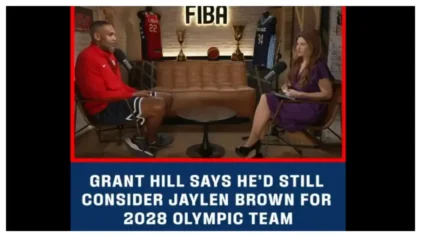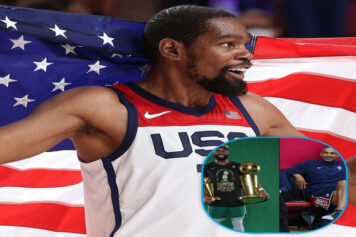The Boston Celtics lost their third straight game on Monday, Nov. 1, falling to the Chicago Bulls 128-114. Boston had a 14-point lead to start the fourth quarter and collapsed down the stretch.
Following the game, Celtics veteran point guard Marcus Smart shared his thoughts on why the team struggled late.
“Every team knows we’re trying to go to Jayson and Jaylen. Every team is programmed and studied to stop Jayson and Jaylen. I think everybody’s scouting report is to make those guys pass the ball. They don’t want to pass the ball.”
Seven games into the season and we’ve already got drama. This is definitely not what first- year head coach Ime Udoka had in mind when he became head coach in June. But Smart wasn’t wrong in his critique.
Celtics Hire Ime Udoka As New Head Coach | He’s Got Pedigree, Nia Long & The Luck Of Nigeria
Late in games, it’s no secret that NBA teams work to get the ball into their best players’ hands. The idea being that the best offensive players in the world can create and score, even against the best defenses.
This often devolves into “hero ball” or an isolation possession.
Again, the best players in the world do fairly well in these scenarios. But league average points per possession in isolation is only .907, according to the NBA Math Twitter account.
Even accounting for the chance a player gets fouled, that’s less than a point per possession. That’s suboptimal.
Thirty-one players have used at least 10 isolation possessions during the 2021-22 #NBA season. Here's how much value they've added relative to league-average isolation production (0.907 PPP): pic.twitter.com/DdHlLxqMi1
— NBA Math (@NBA_Math) October 28, 2021
If a defense only has to worry about the player with the ball in his hands, particularly late in games, it becomes easier to defend even the elite one-on-one players.
Poor Offensive Execution
Washington win in 2 OT. Wizards are 5-1 for only the third time in franchise history. pic.twitter.com/86AFMxHi2m
— Rob Perez (@WorldWideWob) October 31, 2021
Teams that have had success over the years late in games do so because their offense is unpredictable.
Yes they still have elite players that end up with the ball, but that’s usually after a series of passes and cuts. Rendering the defense scrambling.
Elite Offensive Execution
Part of the ability to execute late in games comes with time and maturity. Something Smart understands.
“That’s something that they’re going to learn,” Smart said. “They’re still learning. We’re proud of the progress they’re making, but they’re going to have to make another step and find ways to not only create for themselves but create for others on this team to open up the court for them later down in the game.
In age, Tatum and Brown are 23 and 25, respectively. Both have come into their own as elite shot makers and with their skill sets and ages; this is also the time where tensions can begin to develop over who is the “alpha.” Whose team is it?
Top NBA Opening Night Performances | Is Jaylen Brown Really The Top Dawg In Boston?
Hopefully this is something Udoka can squash. Nothing can break up a team faster than an internal power struggle between players.
It’s interesting to note that the man Udoka replaced said he felt “worn down” with coaching. On its surface that’s fair. Being an NBA head coach is a demanding and stressful position; it’s easy to see how someone would get worn down.
Stevens has been described as worn down with coaching since The Bubble, and welcomed the chance to make the transition to the front office, sources tell ESPN. Stevens will help lead the search for his successor as head coach.
— Adrian Wojnarowski (@wojespn) June 2, 2021
Throw in the circumstances of the last couple of seasons with the pandemic and the “Bubble,” and it all makes sense.
But a worn-down Brad Stevens went immediately from coaching to another high-stress, demanding position: president of Basketball Operations.
If you’re worn down, maybe the front office isn’t the next place to go. Maybe Stevens saw this coming with the Celtics and wanted to get away from the fire?
Who knows.
But so far, this isn’t how Ime Udoka or the Celtics saw this season developing.



